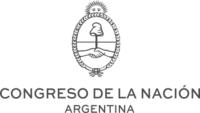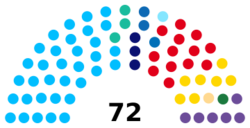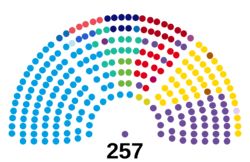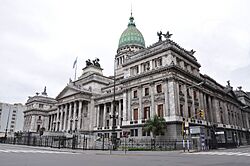Argentine National Congress facts for kids
Quick facts for kids National Congress of ArgentinaCongreso de la Nación Argentina |
|
|---|---|
 |
|
| Type | |
| Type | |
| Houses | Senate Chamber of Deputies |
| Leadership | |
|
Victoria Villarruel, LLA
Since 10 December 2023 |
|
|
Provisional President of the Senate
|
Bartolomé Abdala, LLA
Since 13 December 2023 |
|
President
of the Chamber of Deputies |
Martín Menem, LLA
Since 10 December 2023 |
| Structure | |
| Seats | 329 members
|
 |
|
|
Senate political groups
|
Government (6)
Allies (7)
Independents (25)
Opposition (34)
|
 |
|
|
Chamber of Deputies political groups
|
Government (40)
Allies (39)
Independent (74)
Opposition (104)
|
| Elections | |
|
Senate last election
|
22 October 2023 |
|
Chamber of Deputies last election
|
22 October 2023 |
|
Senate next election
|
19 October 2025 |
|
Chamber of Deputies next election
|
19 October 2025 |
| Meeting place | |
 |
|
| Argentine National Congress Palace Buenos Aires, Argentina |
|
The National Congress of Argentina (or Congreso de la Nación Argentina in Spanish) is a very important part of the Argentine government. It's like the country's main law-making body. It has two main parts: the Senate and the Chamber of Deputies. This two-part system is called bicameral.
The Senate has 72 members, called Senators. Each province and the federal capital choose three Senators. They serve for six years, and some are elected every two years.
The Chamber of Deputies has 257 members, called Deputies. The number of Deputies from each area depends on its population. They serve for four years, and half of them are elected every two years.
The beautiful Congressional Palace is where the Congress meets. It's in Buenos Aires, at the end of Avenida de Mayo. Right next to it, in Congressional Plaza, you can find the Kilometre Zero marker. This is the starting point for all of Argentina's national roads!
Contents
What the Congress Does
How Congress Works
The National Congress of Argentina has two houses: the Senate and the Chamber of Deputies. This is called a bicameral system. They work together to make laws for the country.
Congress has regular meetings, called ordinary sessions, from March 1st to November 30th each year. If something urgent comes up when they are not meeting, the President of Argentina can ask them to have extraordinary sessions.
Senators and Deputies have special protection while they are doing their jobs. This helps them speak freely without fear.
Important Powers of Congress
The Congress has many important jobs. It helps manage Argentina's money, including how much the country owes. It also decides the value of the national money, the Argentine peso.
They create and change laws about many things, like how people do business, how to deal with crimes, and rules for workers. These national laws must work with the laws of each province.
If there are any changes to the borders between provinces, or if a new province is created, the Congress must approve it.
Congress and the World
The Congress also deals with international matters. It must approve or reject any agreements (called treaties) that Argentina makes with other countries. Once approved, these treaties become very important laws.
If Argentina needs to declare war or sign a peace agreement, the Congress must give its permission. They also decide if the national troops can be sent to other places.
The Chamber of Deputies: The Lower House
The Chamber of Deputies is often called the lower house. It has special jobs, like deciding on taxes and customs duties. They also start the process to accuse the President or other high-ranking officials if needed. Sometimes, citizens can even suggest new laws to the Chamber of Deputies!
The Senate: The Upper House
The Senate is known as the upper house. For them to make decisions, a majority of Senators must be present. The Senate reviews and approves laws that the Chamber of Deputies has already passed. They can also suggest changes to laws about how money is shared with the provinces.
The Senate also approves important people chosen by the President. These include judges, ambassadors, and military leaders. They make sure these people are right for the job.
A Look at Congress's Past
Changes to the Senate
Over time, the way the Congress works has changed. A big change happened in 1994. The Argentine Constitution was updated.
Before 1994, the Senate had 48 members. After the 1994 changes, the Senate grew to 72 members. This meant that each province and the federal capital would have three Senators. This change helped make sure more voices were heard in the Senate.
How Members are Chosen
Who Represents Each Province?
Each of Argentina's provinces and the Autonomous City of Buenos Aires sends 3 Senators to the Senate. This means there are always 72 Senators in total.
For the Chamber of Deputies, the number of members depends on the population. Roughly, for every 161,000 people, there is one Deputy. This means there are 257 National Deputies in total.
Here's a look at how many Senators and Deputies each part of Argentina has:
| District | Number of Senators | Number of Deputies |
|---|---|---|
| Autonomous City of Buenos Aires | 3 | 25 |
| Province of Buenos Aires | 3 | 70 |
| Province of Catamarca | 3 | 5 |
| Province of Chaco | 3 | 7 |
| Province of Chubut | 3 | 5 |
| Province of Córdoba | 3 | 18 |
| Province of Corrientes | 3 | 7 |
| Province of Entre Ríos | 3 | 9 |
| Province of Formosa | 3 | 5 |
| Province of Jujuy | 3 | 6 |
| Province of La Pampa | 3 | 5 |
| Province of La Rioja | 3 | 5 |
| Province of Mendoza | 3 | 10 |
| Province of Misiones | 3 | 7 |
| Province of Neuquén | 3 | 5 |
| Province of Río Negro | 3 | 5 |
| Province of Salta | 3 | 7 |
| Province of San Juan | 3 | 6 |
| Province of San Luis | 3 | 5 |
| Province of Santa Cruz | 3 | 5 |
| Province of Santa Fe | 3 | 19 |
| Province of Santiago del Estero | 3 | 7 |
| Province of Tierra del Fuego | 3 | 5 |
| Province of Tucumán | 3 | 9 |
| Total | 72 | 257 |
See also
 In Spanish: Congreso de la Nación Argentina para niños
In Spanish: Congreso de la Nación Argentina para niños
- Opening of regular sessions of the National Congress of Argentina
- Argentine National Congress Palace
- List of current Argentine Senators
- List of current Argentine Deputies
- Politics of Argentina
- List of legislatures by country
 | Chris Smalls |
 | Fred Hampton |
 | Ralph Abernathy |

